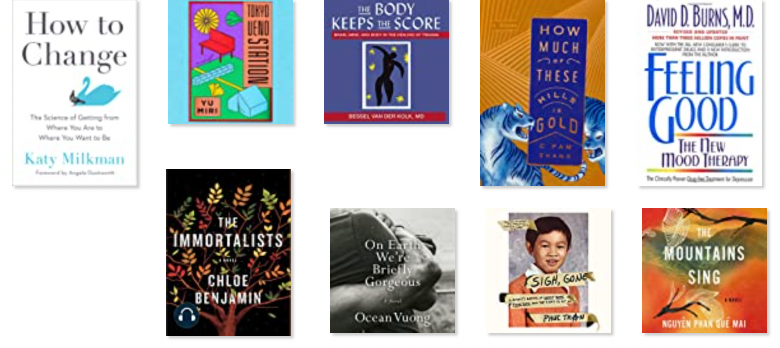I don’t know if it’s always been the case or it is a natural progression from psychology books, but if you noticed I’ve been reading more self-help books lately, I guess that’s true. I mean, I already read professional development books in general, so I was practically already drinking tea in the living room of self-help books. I think 2020 unraveled me and I’m seeing if there are ways that kind of put me back together that don’t involve talking to anyone.
I might try to read just happier get-lost-in-a-story books next month.
Fiction
On Earth We’re Briefly Gorgeous by Ocean Vuong

Why I picked up this book: I kept seeing this book come up and it was available from the library for API heritage month
Mood: Sad poetic narrative
I really liked this book, it was beautifully written. I was telling someone else about this book who had just started it and they said it was too poetic for him—so if you don’t like poetic narrative maybe you wouldn’t like it. It had the descriptive feelings that I felt like Sigh, Gone was missing for me. It was about a first generation Vietnamese-American dealing with race, sexuality, and the opioid epidemic. Honestly I haven’t read stories talking about opioid crisis before and it made me think about how it’s our modern drug problem. The mother in the story works at a nail salon and by the end of the book her back is in so much pain from bending over people’s nails and feet all day she has to lay on the floor because the bed is too soft. It made me wonder how many women that’s true for. I’ve never gotten my nails done.
The Immortalists by Chloe Benjamin

Why I picked up this book: May book club book
Mood: Moody drama where you follow along characters
Everyone in book club enjoyed this book so you might too! The book starts off with 4 young kids going to a fortune teller who predicts their death date and how it affects their lives. Would you want to know? During discussion we also talked about how DNA tests can tell you if you might have certain illness and if we’d want to know.
The Mountains Sing by Nguyen Phan Que Mai

Why I picked up this book: My mom recommended this book by way of her sister by way of her daughter (my cousin). My mom didn’t end up finishing it though, saying all books about the Vietnamese war are the same.
Mood: Family struggling during the war time
This book follows family and generations during the Vietnam War (which is not just the things American did, but the affect of other invasions and colonization). A family of 5 children get torn apart and a mother attempts to bring them back together.
How Much of These Hills Is Gold by C Pam Zhang

Why I picked up this book: This was another API book making the rounds that was newly available
Mood: Family struggling to make in California as miners and prospectors
I mentioned this before, but like, these books are explicitly about Asian culture, they are the stories of people trying figure things out and make it work and they happen to be Asian and so also sometimes racist stuff happens. That’s how I feel about this book: I haven’t read about people trying to make it as prospectors when California was still referred to as a territory. But also the characters were asian and some of them were brought over to work on the railroads. I really liked this book.
Tokyo Ueno Station by Yu Miri

Why I picked up this book: I saw it listed as available in the Libby app and thought the cover looked ok
Mood: want a short journey as a dead man contemplating life.
I didn’t get very into this book, but I think the idea is interesting. The perspective is of a middle aged man who has died and is reflecting on his life and going in and out of the conversations in the area nearby. He was homeless towards the end of his life and lived in a park near Ueno Station. I did think it was interesting to hear about the homeless population somewhere besides the US.
Non-fiction
Feeling Good: The New Mood Therapy by David D. Burns

Why I picked up this book: In a No Stupid Questions podcast they offhandedly talked about whether bibliotherapy actually works. I had never heard of the word before and one of the hosts was like “actually there’s that really famous book from the 80s that’s supposed to have done really well and I looked up and bought an old, used edition of the book because I was very very sad.
Mood: Not feeling good but curious about feeling better
This book was helpful for me. I was reading it at a time I needed it. Especially the first chapters detailing cognitive distortions with some exercises to form more realistic thoughts. I remember thinking: Do people not think like this all the time? It was mind blowing to realize that I almost never have healthy thoughts. I ended up pacing myself and only reading a chapter a week so that I could actually practice some of the things they were talking about.
How to Change: The Science of Getting from Where You Are to Where You Want to Be by Katy Milkman

Why I picked up this book: I kept hearing Angela Duckworth (another behavioral psychologist) talk about her work in my narrow Freaknomics universe and wanted to hear about her work directly.
Mood: Social psychology nerd
I liked this book, of course, although I also felt like I had heard a lot of it in bits and pieces already because like 50% of my podcasts are psychology. If you’re interested or maybe interested, I’d definitely recommend this book for you because it’s so short and too the point, just 200-ish pages! She covers a lot of different studies succinctly and as an added bonus, it’s actionable!
The Body Keeps the Score: Brain, Mind, and Body in the Healing of Trauma by Bessel van der Kolk

Why I picked up this book: When I was learning about trauma-informed research this was another one of the books that kept coming up
Mood: some practitioner-level trauma research in narrative
Ok, I actually don’t think this book is for me, but I am glad I read it. It was probably a little bit more information about trauma and, care, and therapy than I needed as a regular person. It was interesting to hear about the research and best practiced and disheartening to hear about how some of the proven techniques are being taken up or even being acknowledged by the DSM (according to the author). Also now i’m like “how is anyone raising kids without traumatizing them?” I especially don’t recommend for new parents.
Sigh, Gone: A Misfit’s Memoir of Great Books, Punk Rock, and the Fight to Fit In by Phuc Tran

Why I picked up this book: API heritage month continues!
Mood: Memoir
I could really relate to some of the mixed feelings Phuc was going through, especially at the beginning, but i also didn’t feel myself swept away by the narrative or the writing. At times it felt more like an information dump and less like I was there in any particular moment with the author. I think I was specifically interested in hearing more from Vietnamese authors because I feel like I’ve read a lot more form Chinese and Japanese authors.
I read more books this month because I took some time off and listen to audiobooks while I was frantically sewing.

